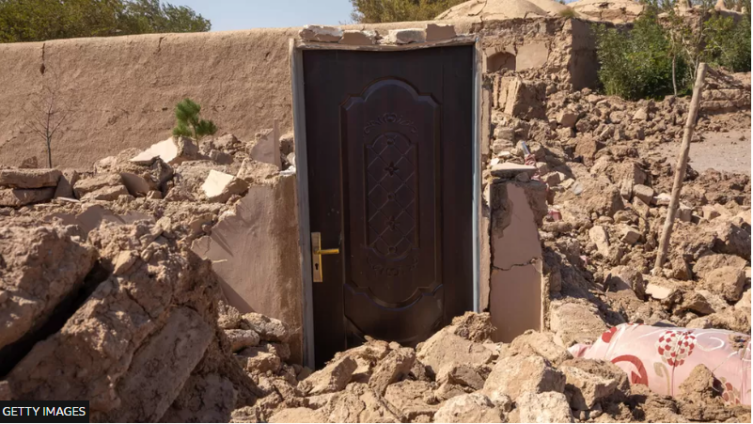Rescuers are digging for survivors of a powerful earthquake that flattened whole villages in Afghanistan, killing more than 1,000 people.
The 6.3-magnitude quake struck Saturday morning in Herat province, a barren landscape dotted with mud brick homes.
Villagers are still using shovels and bare hands to search for more than 500 people missing, the UN says.
Aid, delayed by blocked routes and communication lines being down, only started to trickle in on Monday.
There are fears the death toll could be much higher.
The quake hit Zindajan, a rural district some 40km (25 miles) from Herat city, where "100% of homes are estimated to have been completely destroyed," according to the UN Office for the Coordination of Humanitarian Affairs (OCHA).

Images from the villages show entire houses, which were too fragile to withstand such a quake, reduced to rubble.
"We came home and saw there was nothing left. Everything had turned to mud," one resident Nek Mohammad told AFP news agency. "We started to dig with shovels and whatever we had to rescue women and children from the rubble."
The Taliban government and aid agencies initially struggled to estimate the death toll, or how many remained missing. It's unlikely officials had population records for such remote villages.
The area is also home to communities displaced by war and drought, making it difficult for the local administration to know exactly how many people have been living there.

"From what the colleagues in the field tell us, survivors were terrified, hungry, and desperate for help," said Philippe Kropf, the head of communications for the World Food Programme (WFP). He stressed that a "complete picture" of the situation on the ground is still being formed.
Warning that winter is only a month away, Mr Kropf told the BBC that the latest crisis comes at a time when 15 million people - a third of the population - already do not know where their next meal will come from. The WFP needs some $400m (£327m) in funding to deliver food to remote locations and help millions of the most vulnerable people, including widows and the disabled, to survive winter.
Ill-equipped hospitals have also been struggling to accommodate the injured, who now number more than 1,600. Many of them were sent to the Herat Regional Hospital, where teams from the medical charity Médecins Sans Frontières (MSF) have been since Saturday.
"Fortunately, most of the patients arriving are non-emergency cases," says Prue Coakley, the acting country representative for MSF in Afghanistan. "However, many of them do not have homes to return to, that is why many of them are remaining in the hospital while authorities look for alternative places for them to stay."
She added that a team focused on paediatric patients had been sent to the hospital in Herat. The UN says a majority of the quake survivors who are being treated are women and children, while doctors tell the BBC women and children also account for many of the dead.
The Taliban government has said quake survivors are in urgent need of food, drinking water, medicine, clothes and tents for shelter. Several aid agencies have dispatched help, including the Afghan Red Cross Society, MSF, WFP and Unicef. But the agencies say the cash-strapped country needs more aid.
Afghanistan has been reeling from an economic crisis since the Taliban takeover in 2021, when aid given directly to the government was stopped.
Few countries have pledged money since Saturday's quake. China's Red Cross Society has offered $200,000 (£164,220) in emergency cash aid, Chinese media reported.
Neighbouring Pakistan has said it is in contact with Afghan officials and will "extend all possible support to the recovery effort".
Afghanistan is frequently hit by earthquakes - especially in the Hindu Kush mountain range as it lies near the junction of the Eurasian and Indian tectonic plates.
In June last year, the province of Paktika was hit by a 5.9 magnitude quake which killed more than 1,000 people and left tens of thousands homeless.
Latest Stories
-
Herty Corgie highlights the essence of gratefulness in ‘My Gratitude’
2 hours -
ANNOUNCEMENT: Joy FM temporarily goes off air January 11
2 hours -
Yango honored with two titles at the Technovation Africa Awards 2024
2 hours -
Aowin Traditional Council declares war on illegal mining with spiritual intervention
2 hours -
Leadership must ensure equity for all citizens, regardless of faith – Asiedu Nketiah
2 hours -
Prof. Alex Manu appointed Executive Director at Centre for Social Justice
3 hours -
Imminent changes within some key security agencies, state institutions, and its implications
3 hours -
There are more women than men, but there’s a man for every woman – Rev. Nana Yaa
3 hours -
Nii Kwei releases ‘The Praise Medley’, a celebration of God’s goodness
3 hours -
Mistakes in team composition can be costly, pray for us – Fifi Kwetey appeals to Ghanaians
3 hours -
Mahama forms 5-member Hajj task force to cut pilgrimage costs
3 hours -
Fuel shortage hits Sissala East and West Districts
4 hours -
President Mahama orders immediate probe into 2020 and 2024 election fatalities
4 hours -
Ken Thompson applauds John Mahama’s initial ministerial appointments
4 hours -
Shatana drops new single “Monicitamol” to inspire women
4 hours

